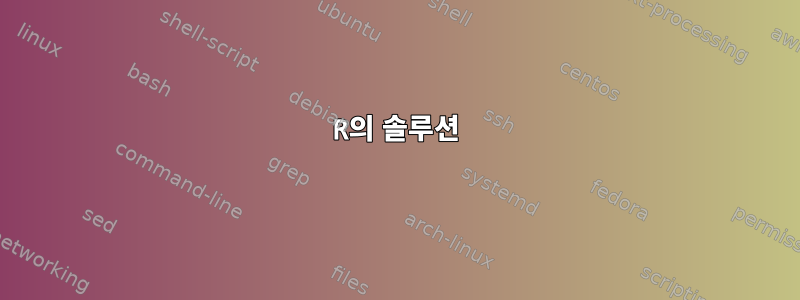
#'100개 이상의 열이 있는 경우 블록의 일부( #'( )로 시작하는 줄)를 구성할 때 코드 줄을 끊(추가) 하고 싶습니다 .#\x27
내 솔루션이 여러 블록에서 작동하지 않습니다.
예시 파일:
#' chunk line
#' big chunk line to split big chunk line to split big chunk line to split big chunk line to split big chunk line to split
#' ruler90123456789012345678901234567890123456789012345678901234567890123456789012345678901234567890
#'
not chunk line do nothing
big do nothing line big do nothing line big do nothing line big do nothing line big do nothing line big do nothing line big do nothing line
#' chunk line
#' big chunk line to split big chunk line to split big chunk line to split big chunk line to split big chunk line to split
#' ruler90123456789012345678901234567890123456789012345678901234567890123456789012345678901234567890
#'
not chunk line do nothing
big do nothing line big do nothing line big do nothing line big do nothing line big do nothing line big do nothing line big do nothing line
내 시도: (블록이 하나만 존재하는 경우 작동함)
perl -0777 -pe '
s{#\x27.*#\x27}{ q{ gets lines from #\x27 to #\x27 (chunk) };
($r = $&) =~ s/\n!\n#\x27//g; q{ removes breaks except followed by #\x27 };
$r =~ s/\G.{0,100}(\s|.$)\K/\n#\x27 /g; q{ before column 100 adds break + #\x27 };
$r =~ s/#\x27 #\x27/#\x27/g; q{ removes duplicated #\x27 };
$r =~ s/\n\n/\n/g; q{ removes duplicated breaks };
$r
}gse' < chunks.txt
예상 출력: (2번)
#' chunk line
#' big chunk line to split big chunk line to split big chunk line to split big chunk line to split
#' big chunk line to split
#' ruler90123456789012345678901234567890123456789012345678901234567890123456789012345678901234567890
#'
not chunk line do nothing
big do nothing line big do nothing line big do nothing line big do nothing line big do nothing line big do nothing line big do nothing line
R의 솔루션
psum <- function(...,na.rm=FALSE) {
rowSums(do.call(cbind,list(...)),na.rm=na.rm)
}
gblines<-readLines("chunks.txt")
newgblines<-character()
i<-1
j<-1
repeat {
newgblines[j] <- gblines[i]
if (grepl("^#\'",newgblines[j] ) & nchar( newgblines[j] ) > 100 ) { # select lines with more than 100 and beginning in #'
repeat{
greps<-gregexpr(pattern ="\\s",newgblines[j])[[1]] # get position of spaces
lenG<-length(greps)
sums<-psum(-greps , rep(100,lenG ) ) # calculate which space is closest to col. 100
index <- which(sums>0)
minSums<- min(sums[index])
index2<-which(sums==minSums) # index of space in greps
cutpoint<-greps[index2]
nchar2<-nchar(newgblines[j]) # number of chars. in line
strFirst <-substr(newgblines[j],1,cutpoint) # cut before col. 100
strSecond<-substr(newgblines[j],cutpoint+1,nchar2) # segmente after col. 100
newgblines[j]<-strFirst
j<-j+1
newgblines[j]<-paste0("#\' ",strSecond)
if (nchar(strSecond)<=100 ){
break
}
} #
} # if
i <- i+1
j <- j+1
if (i>length(gblines) ){
break
}
}
newgblines
답변1
거의 다 왔습니다.
다음 두 가지 사항을 변경합니다.
- 변화
도착하다s{#\x27.*#\x27}{s{#\x27.*?#\x27$}{ - 그리고 변화
도착하다}gse' < fileName}mesg' < fileName
기본적으로 탐욕스러운 검색 및 교체를 수행하고 있습니다. 대신 필요한 것은 블록 지향 검색 및 교체 작업입니다.
#' 오른쪽에 개행 문자가 보이는 마커를 사용하면 블록의 끝이고 정규식은 .*?탐욕스럽지 않은 버전입니다..*
자세한 내용은 다음을 참조하세요.펄 문서
답변2
#'으로 끝나는 블록을 사용하지 않는 대체 일반 답변 완벽하지는 않지만 더 잘 작동합니다.
perl -0777 -pe '
q{ 4 manual entries };
$max_length = 100;
$line_filter_pattern = "#\x27 ";
$prefix_pattern = "#\x27 ";
$break_point = " "; q{ character in which to break lines };
$linebreak_prefix = "\n$prefix_pattern"; q{ \n is linebreak };
$lp_length = length($linebreak_prefix);
q{act in lines with prefix pattern };
s{$line_filter_pattern.*?$}{
($r2 = $r = $&);
q{ check if splitting makes changes };
$r2 =~ s/\G.{0,$max_length}($break_point|.$)\K/$linebreak_prefix/gs;
if(length($r2) > length($r) + $lp_length) {
q{ add breaks and prefixes in a loop way };
$r = $r2;
$r =~ s/$linebreak_prefix$//g;
}
$r }gsem' < input.file > output.file


